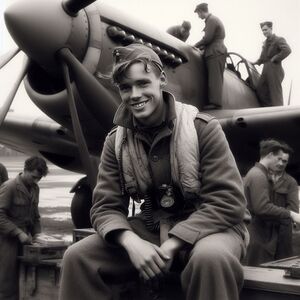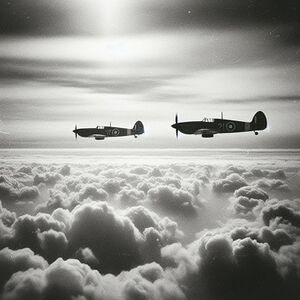Cameron Doyle Greene: Difference between revisions
m (→Early Life) |
|||
| Line 37: | Line 37: | ||
== Early Life == | == Early Life == | ||
Cameron Doyle Greene was in Chester-on-Moore, Arcerion, on 7 June 1915, the son of a shipping executive, Eric Yates Greene and his wife, Dorothy née Lancaster. He attended several primary and elementary schools, finishing his last six years at South Moorden Men's College, where he finished his formal secondary education. Greene delayed his post-secondary education beliefs as he wished to work and travel Arcerion, and spent much of the next year moving between several jobs, both working for Arcerion Steel Corporation in Easthampton as a foreman, and then Royal Arcerion Fire Service as a firefighter in Easthampton. After this year of varied employment, he began applying to universities and colleges in Arcerion and the Republic of Alstin. Greene performed well on his University entrance exams, and accepted an offer from Ardmori Anglican University, the most prestigious University in Arcerion. At 18, he began an engineering degree for civil engineering, with a minor in philosophy, which he was enrolled in at the outbreak of the Second Great War. | Cameron Doyle Greene was in Chester-on-Moore, Arcerion, on 7 June 1915, the son of a shipping executive, Eric Yates Greene and his wife, Dorothy née Lancaster, the youngest of six children. He attended several primary and elementary schools, finishing his last six years at South Moorden Men's College, where he finished his formal secondary education. Greene delayed his post-secondary education beliefs as he wished to work and travel Arcerion, and spent much of the next year moving between several jobs, both working for Arcerion Steel Corporation in Easthampton as a foreman, and then Royal Arcerion Fire Service as a firefighter in Easthampton. After this year of varied employment, he began applying to universities and colleges in Arcerion and the Republic of Alstin. Greene performed well on his University entrance exams, and accepted an offer from Ardmori Anglican University, the most prestigious University in Arcerion. At 18, he began an engineering degree for civil engineering, with a minor in philosophy, which he was enrolled in at the outbreak of the Second Great War. | ||
In 1935, with the beginning of hostilities, Greene and his two brothers went to the recruiting office together over the acadmeic witner holidays to join the Arcer Army. However owing to a clerical error, Greene ended up being enrolled in the Arcer Air Force. His two brothers continued on to both serve as infantry officers in the Royal Arcerion Infantry Corps, both being posted to the Royal Moorden Regiment, and then being transferred to the Arcerion Parachute Regiment at its inception. | In 1935, with the beginning of hostilities, Greene and his two older brothers went to the recruiting office together over the acadmeic witner holidays to join the Arcer Army. However owing to a clerical error, Greene ended up being enrolled in the Arcer Air Force. His two brothers continued on to both serve as infantry officers in the Royal Arcerion Infantry Corps, both being posted to the Royal Moorden Regiment, and then being transferred to the Arcerion Parachute Regiment at its inception. | ||
== Second Great War == | == Second Great War == | ||
Greene's flight training commenced in 1935, and after completing basic officer's training was sent to navigator's school, despite his wishes to serve as a fighter pilot. After passing his navigator's course he was posted to No.81 Squadron as a navigational officer. No.81 Squadron at the time was equipped with military cargo aircraft, assigned to carry men, weapons and equipment in an airlift and support capacity. During the early war period prior to the invasion of The Cape, the Squadron mainly moved supplies from New Archduchy and conducted resupply operations to Howland Governorate under fighter escort. | |||
In 1936, Greene received word that his oldest brother, Captain Arthur Greene (B Company, 1st Battalion, Arcerion Parachute Regiment) was missing in action after a combat jump into The Cape during Operation Lightfoot. Contemporary interviews from members of No.81 Squadron who were close with Greene said this greatly affected his morale. Eventually his brother would be found wounded, and repatriated to Arcerion for recovery. | |||
=== Navigation Officer and Fighter School === | === Navigation Officer and Fighter School === | ||
=== No.30 Squadron === | === No.30 Squadron === | ||
Revision as of 14:52, 23 December 2023
Cameron Doyle Greene | |
|---|---|
 Cameron Doyle Greene, photographed in 1938 next to his fighter before operations over The Cape, during the Second Great War. | |
| Nickname(s) | 'Cam-o' |
| Born | 7 June 1915 Chester-on-Moore, Moorden Governorate, Arcerion |
| Died | 1 June 1993 (aged 77) Kinnaird, Arcerion |
| Buried | St. Martin's Cemetery |
| Allegiance | Arcerion |
| Service/ | |
| Years of service | 1935–1943, 1958-1962 |
| Rank | Wing Commander |
| Unit | No.30 Squadron |
| Battles/wars | Second Great War |
| Awards | Arcerion Cross Distinguished Flying Cross |
| Other work | Senior Executive at Aeroco |
Wing Commander Cameron Doyle Green, AC, DFC (7 June 1915 - 1 June 1993) was an Arcerion Air Force (AAF) officer and one of the top Arcer fighter aces of the Second World War, credited with at least 36 aerial victories.
Born in Chester-on-Moore, Greene volunteered for service originally with the Arcer Army, but a clerical error caused him to be enrolled in the Arcer Air Force. Greene was originally assigned as a navigation officer with No.81 Squadron, transporting heavy goods and soldiers around Arcerion and Crona. After passing pilot's exams, Greene was trained and then assigned to No.30 Squadron, flying interceptor fighters against The Cape and Caphiria. His younger brothers, both paratroopers in the Arcerion Parachute Regiment, were both wounded during actions in The Cape. He flew extensive missions over The Cape, and by 1937 he had already been credited with downing 19 enemy aircraft in combat. Due to exhaustion and combat stress, he was then sent to flight school as an instructor for the majority of 1938.
Greene then went on to be reassigned to No.30 Squadron as the Squadron Commander, and under his command led it through the 1939-1940 period of actions over the Songun Sea. He finished the war with 34 aerial victories. Post-war, he retired as a member of the Air Force Reserve, but was reactivated and promoted as a Wing Commander of No.3 Wing shortly before the Istrenyan Crisis. Greene then went on to earn the Arcerion Cross for his actions during the Istrenyan Crisis, and earning his final two aerial victories, bringing the total to 36 before retiring shortly after the end of the Istrenyan Crisis.

After the conclusion of the Istrenyan Civil War, Greene worked as a pilot for several airlines as a commercial airline pilot, eventually moving into an executive role by the 1980s. With the creation of Aeroco in 1989, he was brought on as a senior executive before he died of natural causes at 73.
Early Life
Cameron Doyle Greene was in Chester-on-Moore, Arcerion, on 7 June 1915, the son of a shipping executive, Eric Yates Greene and his wife, Dorothy née Lancaster, the youngest of six children. He attended several primary and elementary schools, finishing his last six years at South Moorden Men's College, where he finished his formal secondary education. Greene delayed his post-secondary education beliefs as he wished to work and travel Arcerion, and spent much of the next year moving between several jobs, both working for Arcerion Steel Corporation in Easthampton as a foreman, and then Royal Arcerion Fire Service as a firefighter in Easthampton. After this year of varied employment, he began applying to universities and colleges in Arcerion and the Republic of Alstin. Greene performed well on his University entrance exams, and accepted an offer from Ardmori Anglican University, the most prestigious University in Arcerion. At 18, he began an engineering degree for civil engineering, with a minor in philosophy, which he was enrolled in at the outbreak of the Second Great War.
In 1935, with the beginning of hostilities, Greene and his two older brothers went to the recruiting office together over the acadmeic witner holidays to join the Arcer Army. However owing to a clerical error, Greene ended up being enrolled in the Arcer Air Force. His two brothers continued on to both serve as infantry officers in the Royal Arcerion Infantry Corps, both being posted to the Royal Moorden Regiment, and then being transferred to the Arcerion Parachute Regiment at its inception.
Second Great War
Greene's flight training commenced in 1935, and after completing basic officer's training was sent to navigator's school, despite his wishes to serve as a fighter pilot. After passing his navigator's course he was posted to No.81 Squadron as a navigational officer. No.81 Squadron at the time was equipped with military cargo aircraft, assigned to carry men, weapons and equipment in an airlift and support capacity. During the early war period prior to the invasion of The Cape, the Squadron mainly moved supplies from New Archduchy and conducted resupply operations to Howland Governorate under fighter escort.
In 1936, Greene received word that his oldest brother, Captain Arthur Greene (B Company, 1st Battalion, Arcerion Parachute Regiment) was missing in action after a combat jump into The Cape during Operation Lightfoot. Contemporary interviews from members of No.81 Squadron who were close with Greene said this greatly affected his morale. Eventually his brother would be found wounded, and repatriated to Arcerion for recovery.